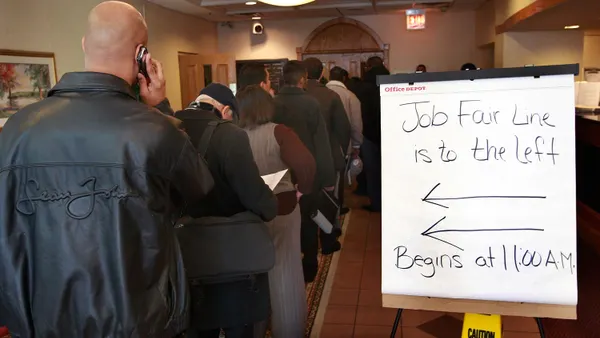Dive Brief:
- A Hawaii state initiative is looking to incentivize remote U.S. workers who live outside the state to work remotely in Hawaii via a new temporary residency program, according to a Nov. 30 statement.
- The program, Movers & Shakas, will offer participants a free round-trip flight to Hawaii in addition to discounted hotel stays, co-working space and other amenities as well as community-building opportunities. Applicants must already be employed in the U.S. and must be eligible to work from home, and the program requires participants to stay in Hawaii for at least 30 consecutive days.
- Applicants will also be required to make a pledge to respect the natural resources and culture of Hawaii during the stay, Movers & Shakas said, and participants will be matched with Hawaii nonprofits to whom they will commit a set number of hours per week to strengthen local communities. Applicants will be accepted on a rolling basis, but the program will begin with a cohort of 50 applicants to be selected from online applications submitted by Dec. 15.
Dive Insight:
In less than 12 months, the business conversation on remote work has shifted entirely due to the COVID-19 pandemic. Prior to 2020, some states and localities experimented with programs aiming to attract remote workers. In 2018, a program launched by the George Kaiser Family Foundation offered remote workers and entrepreneurs up to $10,000 in financial assistance and bonuses to move to Tulsa, Oklahoma. Similar programs exist in states including Vermont, which issued two-year grants worth up to $5,000 to applicants who work primarily from a home office or co-working space — although a Jan. 2020 update stated that applications "are not being accepted at this time," citing funding issues.
In a pre-pandemic environment, such state and local programs faced challenges due to the relative popularity and draw of larger cities, sources previously told HR Dive. But an embrace of remote work in the wake of COVID-19 has changed employers' approach; a Gartner survey of company leaders published in July found more than 80% planned to allow workers to work remotely at least part of the time upon reopening.
That research coincides with promises by some companies to continue remote work support even after the pandemic ends. Indeed, for example, said it would allow workers in certain jobs to continue working remotely on a permanent basis. Twitter announced earlier this year that it would allow employees currently working remotely "to continue to do so forever" if they chose.
Those behind the Movers & Shakas program said that a key motivation for the effort is the recent decline in travel to Hawaii. "We wanted to help fill the gap from the decrease we've experienced in the 7-day visitors to our state," Jason Higa, CEO of FCH Enterprises and a leader of Movers & Shakas, said in the group's statement. "We believe this program will attract many former Hawai'i residents and professionals seeking a safe, warm environment to continue living their normal lives while contributing to the Hawai'i community."
Employers who decide to permit workers the ability to move while working remotely may have some decisions to make regarding employee pay. A recent survey of leaders at 344 North America companies by Willis Towers Watson found 26% would pay employees based on their location, while 18% said they would determine pay levels by determining the market value of employees' skill sets before applying a geographic differential.
Conversations on remote work pay have already popped up at major employers. Facebook CEO Mark Zukerberg said in a May teleconference that employees who move to new areas could see salary adjustments, adding that there would be "severe ramifications" for employees who were not honest about their moves, MarketWatch reported.











